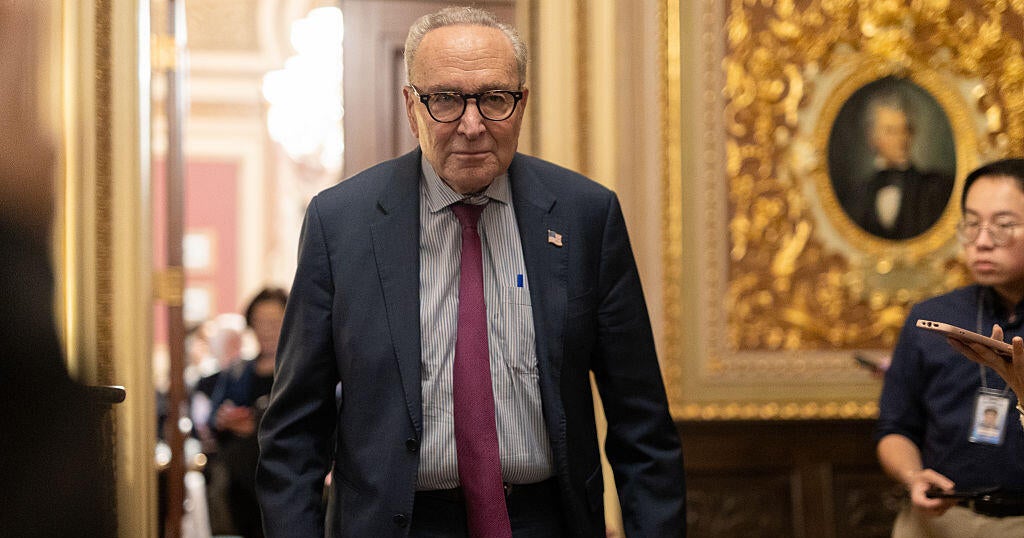-
-
by
News PRO
Washington — The decision by eight Democratic senators to embrace a deal to end the government shutdown has infuriated many members of the party, with critics saying the lawmakers abandoned the 40-day fight without serious concessions on the health care tax credits that were central to Democrats’ demands.”Pathetic,” California Gov. Gavin Newsom said. “There’s no way to defend this,” Sen. Chris Murphy of Connecticut argued. Sen. Bernie Sanders of Vermont, an independent who caucuses with Democrats, said “it would be a policy and political disaster for the Democrats to cave.”The reaction is a reflection of the frustration among many Democrats, particularly progressives, who had urged their party to keep fighting after the strong Democratic performance in last week’s elections. But the shutdown’s ongoing toll was ultimately too steep for some of the party’s more moderate members to stomach.The resulting deal has exposed fault lines within the party that could reverberate over the months ahead and frame the party’s internal debate heading into the primaries for next year’s midterm elections. And it has led some congressional Democrats and progressive groups to call for Senate Minority Leader Chuck Schumer to step down, despite his personal opposition to the agreement.The shutdown dealThe Democrats who broke ranks and voted to move forward had been engaged in bipartisan talks to find an off-ramp for several weeks. Led by Sens. Jeanne Shaheen and Maggie Hassan of New Hampshire and Sen. Angus King of Maine, the deal they struck secured a vote next month on Affordable Care Act tax credits that Democrats have sought to extend. But the agreement doesn’t guarantee an outcome of the vote, and most Republicans have made no secret of their opposition to extending the subsidies. Even if some version of an extension does pass the Senate, House Speaker Mike Johnson has not committed to bringing it up in the House.”I understand the frustration and obviously I didn’t agree with that decision,” Democratic Sen. Brian Schatz of Hawaii told reporters Monday. “But what we have to make sure of now is that the health care fight lives outside of the appropriations process and doesn’t depend entirely on the government being shut down. So now we have a fight in front of us.” The Senate Democrats who crossed the aisle have pointed to other provisions in the agreement to argue it was worthy of support. A new version of the funding bill would reverse all government layoffs that occurred during the shutdown and prevent them for a limited time going forward. The deal would also restore funding for the Supplemental Nutrition Assistance Program at higher levels, and pave the way for a bipartisan appropriations process on other spending bills.The eight Democrats also argued there is value in putting Republicans on the record with a vote on the health insurance issue, which Democrats have thrust into the spotlight with the shutdown fight. The moderates viewed the deal — after Republicans leaders refused to budge — as the best possible offer they could secure.”We stood up to President Trump for 40 days,” Shaheen said on “CBS Mornings” Monday.The New Hampshire Democrat defended the move to cross the aisle despite the lack of tangible progress on health care, saying “we’re going to be able to continue fighting on that issue because of the agreement that we struck with the Senate majority.””But we’re also going to end the suffering of millions of Americans,” she said, pointing to the millions of people who have not received food assistance, and the federal employees and air traffic controllers who have not received paychecks. “And we’re going to live to fight another day — and that’s what we need to keep people focused on,” Shaheen said. “It’s not the Democrats who broke ranks who are the issue here.”Critics are also directing ire at the party’s leaders for allowing the defections. Almost immediately after the details of the deal came to light, Schumer faced calls for his replacement as the party’s leader in the upper chamber.”Senator Schumer is no longer effective and should be replaced. If you can’t lead the fight to stop healthcare premiums from skyrocketing for Americans, what will you fight for?” Democratic Rep. Ro Khanna of California said on X.”Tonight is another example of why we need new leadership. If [Schumer] were an effective leader, he would have united his caucus to vote ‘No’ tonight and hold the line on healthcare,” wrote Rep. Seth Moulton of Massachusetts, a Democrat who is running for Senate.For his part, Schumer outlined his own opposition to advancing the measure to fund the government Sunday, railing against Republicans for refusing to engage with Democrats on the health care issue during the shutdown while pledging to continue the fight. “I must vote no — this health care crisis is so severe, so urgent, so devastating for families back home that I cannot in good faith support this CR that fails to address the health care crisis,” Schumer said on the Senate floor ahead of the vote. Late last week, Schumer said Democrats would reopen the government if Republicans agreed to a one-year extension of the health insurance tax credits. But Republicans swiftly rejected the offer. The New York Democrat faced a windstorm of criticism during the last funding fight in March, when he voted to advance a GOP-led continuing resolution. This time around, Schumer made a point of putting up a fight, engaging early with Republicans and the White House to negotiate a deal on health care while keeping his caucus largely unified against the GOP’s funding plan for almost two months. Still, since the beginning it appeared unlikely that the leader would make it out of the funding fight completely unscathed.
Share this:
- Click to share on Facebook (Opens in new window) Facebook
- Click to share on X (Opens in new window) X
- Click to share on Reddit (Opens in new window) Reddit
- Click to share on LinkedIn (Opens in new window) LinkedIn
- Click to share on Pinterest (Opens in new window) Pinterest
- Click to share on Tumblr (Opens in new window) Tumblr
Related
OUTLAW CHEMICAL FREE SOAPS AND NATURAL BODY PRODUCTS!

PPR MERCH HERE NOW! CLICK THE AD TO SHOP!!!


New Orleans Pelicans News
Rockets Stun Pelicans in Wild 130-128 Birmingham Finish

New Orleans Saints News
The Monday After: 10 Good and Bad Items from Saints/Patriots Match

New Orleans Saints News
Saints Monday After: Tough Loss, McCoy Out, Rattler Still Starter














